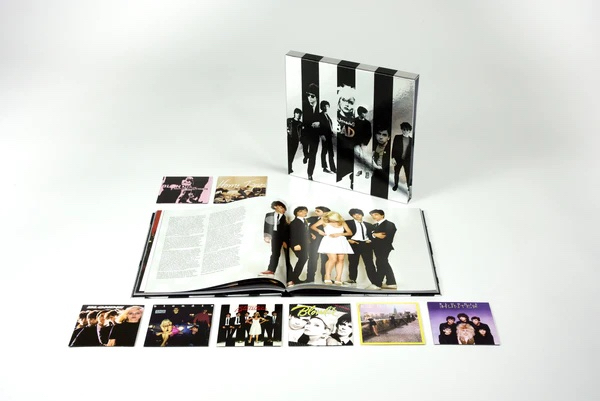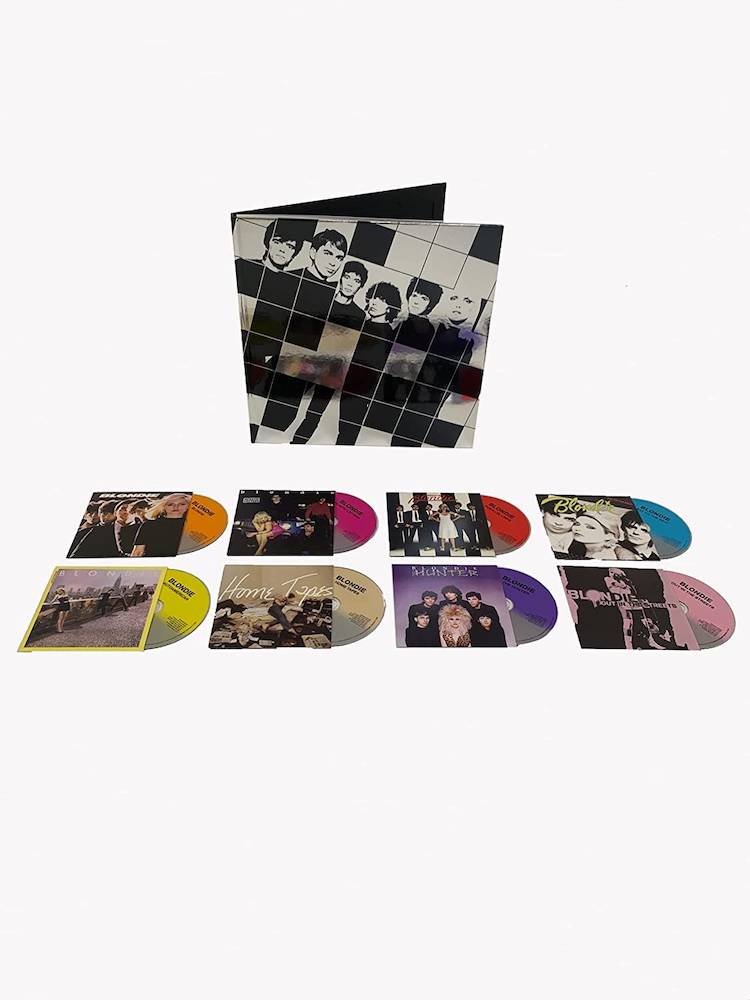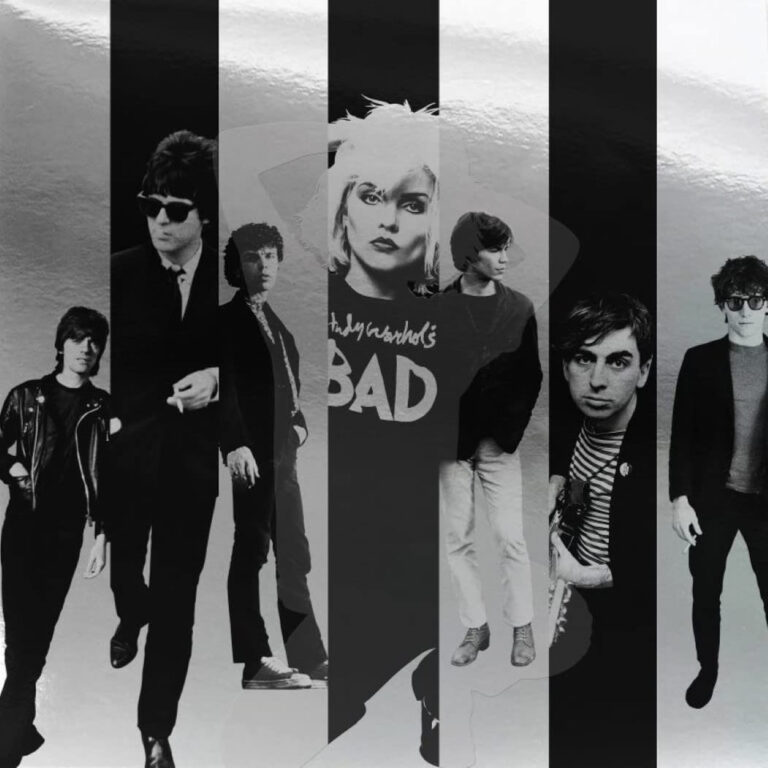There must be people who literally died while waiting for the release of Blondie’s Against the Odds 1974–1982 box set.
It took the group until 2018—more than three decades after the end of its peak period—to announce that the collection would be issued the following year as The Complete Studio Recordings 1975–1982. That box never showed up and neither did an explanation, though August 2020 brought a statement on the band’s website that “the first Blondie archival box set [would be] coming in 2021.” In May of that year, the group’s drummer tweeted that the anthology would “definitely” arrive in August, but in July, he reported that “due to vinyl production delays, it looks like release date moved to 2022.” Well into 2022, as it turns out, but on August 26, the set finally arrived.
The box—which weighs in at nearly eight pounds, contains eight CDs, and has a playing time of just under seven hours—isn’t likely to disappoint many fans. It embraces 123 tracks (though publicity materials tout 124 and the box’s wrapper promises 125) and features remixed, remastered versions of all six of Blondie’s peak-period LPs, each with a replica of the original picture sleeve and each augmented with bonus numbers, plus two discs with extra material. About three dozen of the box’s tracks have not previously been released. The CDs are encased in a lavishly illustrated 128-page hardcover book that offers a band history as well as commentary by its members and producers Richard Gottehrer and Mike Chapman.
A few completists will no doubt complain that some obscurities are missing, as are the albums that the group issued after 1982, among them 1999’s bestselling No Exit, which spawned a No. 1 U.K. single, as well as three other latter-day studio LPs and several live recordings. Perhaps all that will show up in a future box. Meanwhile, Against the Odds offers a huge dose of music from the band’s peak years. (It may even be too much for some fans, and for them, there are three-CD and four-LP editions. For those who want everything on vinyl, meanwhile, there is also a 10-LP version.)
The box does an excellent job of explaining why Blondie’s members deserved their 2006 induction into the Rock and Roll Hall of Fame. Though Ken Shipley, who co-produced the package, insists it “is not hyperbole” to call the group’s recordings “among the most timeless music of its era, or any era,” that may be a bit of an overstatement. Still, Blondie was the most commercially successful act to emerge from the punk/new wave movement, and for good reasons.
The band comfortably embraced a wide assortment of genres, growing rapidly from its CBGB roots and delivering everything from a 1960s girl group sound to garage rock, disco, and even elements of surf music, doo-wop, reggae, heavy metal, and rap. Moreover, it had a well-honed sense of humor, addictive hooks, and first-rate production help. And it found ways to maintain somewhat of an alt-rock image while emphasizing melodies and hooks to appeal to mainstream listeners. (The band never shied away from commercialism; indeed, its website URL is shop.blondie.net.)

At the Starting Gate
Out in the Streets, the first disc in the box, offers a glimpse of Blondie at the starting gate via eight tracks, all recorded in the two years prior to the release of the group’s eponymous debut LP. Among the contents: two early versions of “Heart of Glass” (one called “Once I Had a Love,” the other “The Disco Song”), a cover of Ike and Tina Turner’s “Sexy Ida,” and two readings of “Out in the Streets,” a relatively obscure 1965 single by the Shangri-Las, a group Blondie has cited as a major influence. (One of these Shangri-Las covers previously appeared in 1994’s Platinum Collection.)
Next up is Blondie, the group’s sex-soaked 1976 debut LP, where vocalist Deborah Harry reinvents herself as punk’s answer to Marilyn Monroe, On the album—which finds Harry backed by guitarist Chris Stein, keyboardist Jimmy Destri, bassist Gary Valentine, and drummer Clem Burke—the band draws heavily on pop while keeping one foot planted firmly in the new wave movement. The disc features a just-right production by Richard Gottehrer, the Brill Building songwriter who went on to co-found Sire Records and helped to launch the Talking Heads, the Ramones, and others.
The set opens with Blondie’s first single, the propulsive “X Offender,” a Harry/Valentine number about a prostitute who falls in love with the cop who arrests her. The album also includes Destri’s “Looks Good in Blue,” which seems lyrically like a sequel to the lead-off track and features Harry offering a double entendre: “If it’s alright with you, I could give you some head / and shoulders to lie on.” (Clever, but hardly the first pop song to sneak an oral sex reference onto the radio; see, for example, Jefferson Starship’s “Miracles” and Lou Reed’s “Walk on the Wild Side.”) Then there’s Harry and Stein’s seductive “In the Flesh,” one of two tracks on the album to feature backup vocals by famed Brill Building songwriter Ellie Greenwich, who co-wrote several Shangri-Las tunes, including the one mentioned above. Bonus tracks include single and alternate versions of several of the album’s numbers as well as a flubbed intro to “X Offender.”
The album signaled a band worth watching but made no dent in the U.S. charts, though it and one of its singles (“In the Flesh”) produced major hits in Australia.
With Gottehrer still handling production, 1977’s Plastic Letters finds the group again delivering numbers reminiscent of 1960s girl groups, among them “Denis,” which is a retitled cover of “Denise,” the 1963 Randy and the Rainbows hit. Harry says, “I thought if we played a song that had been popular, the DJs would finally listen to us.” They did—but mostly just in Europe, where the recording produced a major hit. Success remained elusive in the States, despite the excellence of that number and such other standouts as the irresistibly hooked “(I’m Always Touched by Your) Presence, Dear.”
Bonus tracks on this sophomore release include alternate takes and an interesting though inferior-to-the-original rendition of the Doors’ “Moonlight Drive.”
A Worldwide Chart-topper
Parallel Lines, Blondie’s 1978 breakthrough album, made the Top 10 on U.S. charts and features the crew that would remain together throughout the remaining years covered by this box: Britain’s Mike Chapman, who has also worked with the Knack, takes over as producer; the band, meanwhile, now consists of Burke, Destri, Stein, and Harry, plus Frank Infante, who played on Plastic Letters, and British bassist Nigel Harrison.
Here, the group begins to downplay its new wave roots and head more fully into pop territory on songs like “One Way or Another” as well as “Hanging on the Telephone,” a cover of a number by an L.A. rock band called the Nerves. The album also features Harry and Stein’s propulsive disco entry, “Heart of Glass,” a No. 1 worldwide hit; Stein’s instantly likable “Sunday Girl”; a raucous cover of Buddy Holly’s “I’m Gonna Love You Too”; and Harry, Stein, and Destri’s “Picture This,” where Harry promises, “I will give you my finest hour, the one I spent watching you shower.” Among the five bonus tracks are a demo version of “Heart of Glass” and a French-language reading of “Sunday Girl.”
While not quite as successful or satisfying as Parallel Lines, 1979’s Eat to the Beat includes Harry and Stein’s terrific “Dreaming,” which opens with high-octane percussion and begins with Harry singing, “When I met you in the restaurant / You could tell I was no debutante.” Also here are “Call Me,” the band’s second disco-flavored hit and second chart-topper, which Harry wrote with Italian producer Giorgio Moroder; Harry and Stein’s “Sound-a-Sleep,” a lullaby that sounds like a companion to the Beatles’ “Good Night”; and Destri’s “Living in the Real World,” a garage rocker. The five bonus tracks include Infante’s punky “Underground Girl” and an instrumental version of Harry and Harrison’s anthemic “Union City Blue.”
Autoamerican, the 1980 follow-up to Eat to the Beat, delivers two No. 1 hits: a reggae cover of Jamaican singer John Holt’s “The Tide Is High,” which appears here in the long album version and is so catchy you may not be able to get it out of your head even if you try; and Harry and Stein’s “Rapture,” which has the distinction of being the first U.S. chart-topper to feature a rap vocal. Also here: Harry and Stein’s atypical, retro “Here’s Looking at You” and, among the bonus tracks, a demo recording of “The Tide Is High” and a disco version of “Rapture.”

The Last Gasp
On The Hunter, Blondie’s sixth album, the group goes hunting for a memorable song and doesn’t find it. In fact, this 1982 LP, which reportedly resulted because of a contractual obligation and produced no major hits, seems like a last gasp. Stein’s Caribbean-flavored “Island of Lost Souls” sounds like an attempt to repeat the chart success of “The Tide Is High.” It doesn’t, and you don’t have to be Clive Davis to hear why. Inspiration appears to be lacking throughout this disc, which undoubtedly explains why it proved to be the last Blondie album for 17 years. The only bonus track is a holiday rap number called “Yuletide Throw Down” that finds Harry sharing vocals with hip-hop artist Fab 5 Freddy.
The box concludes with Home Tapes, a disc that includes nine sporadically interesting odds and ends. Among them: a dreamy version of “Sunday Girl”; instrumental synthesizer mixes of “Heart of Glass,” “Call Me,” and The Hunter’s “War Child”; and a cover of “Ring of Fire” that delivers some heat despite not holding a lighted candle to Johnny Cash’s original.
Against the Odds, the box set’s title, offers a reminder that Blondie’s massive success came despite initial years of struggle, internal conflicts, a lack of industry connections, and other obstacles. It did indeed. In retrospect, though, the group’s many strengths suggest that the odds may have been in its favor all along.
Jeff Burger’s website, byjeffburger.com, contains five decades’ worth of music reviews, interviews, and commentary. His books include Dylan on Dylan: Interviews and Encounters, Lennon on Lennon: Conversations with John Lennon, Leonard Cohen on Leonard Cohen: Interviews and Encounters, and Springsteen on Springsteen: Interviews, Speeches, and Encounters.



